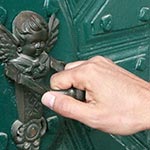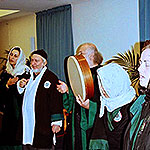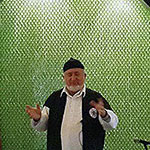Adab – Good Manners
In the process of cleansing through the levels of nafs (egoistic or animalistic nature), the murid (Sufi student) achieves good ahlak, or beautiful character. These are the noble traits that adorned Prophet Muhammad (peace be upon him), and helped bring him to closeness with Allah. Good ahlak will carry the murid through life's circumstances with grace and fortitude because it is the seedbed of righteous conduct.
We have placed all that is on the earth as a glittering show thereof, that We may test them: which of them is best in conduct. (Qur'an 18:7)
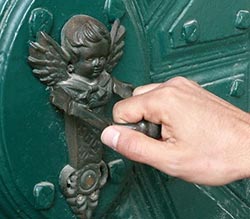
Putting good ahlak to use in action is known as the practice of adab. It is the outward manifestation of one's inner willingness to accept Allah's decree and to serve his Lord lovingly. Actions performed with adab reflect the realization that, even though Allah has given us the conscious will to make decisions, we do not exercise this privilege independently but only as executors of Allah's energy and attributes.
Many shaykhs have said that the whole of Sufism is adab. Adab is doing the right thing, at the right time, in the best way possible. It is the way of harmony, acting with deference to the scheme of the whole. The expression of adab is shown in courtesy, politeness, a pleasant social demeanor. It is a way of behaving graciously, which flows from the foundation of an inner attitude of surrender.
Adab in the Sufi Circle
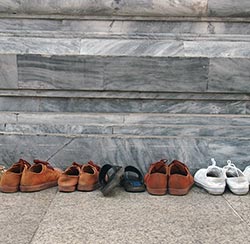
When a dervish (Sufi practitioner) removes his shoes and walks through the entrance of the dergah or tekke, the Sufi center, he leaves the everyday world with its worries and problems outside. The dergah becomes a school in which to practice adab, or good manners, proper behavior and courtesy.
Our attitude in going to the tekke should be humble. We are there to observe, listen and learn. We should treat others as brothers, sisters and decent human beings, and assume that the other attendees are more spiritually developed than ourselves. The tekke is the place to practice a self-effacing attitude to the shaykh and the other murids. It is the place to learn service. One should speak softly, sit quietly, and follow the directions of the shaykh or leader at the time. The talk should focus on Allah, not our nafs (egos; selves). We do not go to the tekke to gossip or to backbite. We go there to talk about Allah so we can get rid of our negative habits. The aim is to control our nafs, which is our mechanical, egoistic nature. One reason to practice adab is because our nafs does not want to.
The key individual in the adab of a Sufi circle is, of course, the shaykh or shaykha. He or she is the one who sets the tone of the halka (circle). The shaykh decides what will be studied in the gathering, when the activity will begin and when it will end. Communications pass through him. He is the first person the dervish greets when he arrives at the tekke, and the first and last one of whom the dervish takes his leave.
We learn by listening and observing. If you want to say something while the shaykh is talking, or if you have a question, politely ask the shaykh for permission to talk after it seems that the shaykh may be finished speaking. The shaykh might have you wait because in a teaching circle what is coming through the shaykh’s heart is a direct spiritual message that might be forgotten if he is interrupted.
We may show disagreement with the shaykh or other murids in a respectful way, although this does not mean we are right. If you hear something that you disagree with, put it in the "bag" behind you to be contemplated later. There might come a time when you understand what you had previously disagreed with.

All instructions given by the shaykh to murids should be treated as confidential, just as all personal issues discussed by the murid with the shaykh are confidential. The dervish does not ask a fellow student about her practice or compare his to the others'. Practices are given for the particular person's guidance and most likely will be quite different than the others'. Discussion of "visions" and other spiritual phenomena are discouraged between murids because of the confusions, as well as subtle competitiveness, that may arise, unless they are being used in teaching by the shaykh to help the brother or sister murid.
The most destructive and damaging problem in a spiritual group is backbiting. Backbiting occurs when one or more people criticize the character of another individual who is not present. This kind of destructive behavior can destroy a learning circle, and once the damage is done it is difficult to repair. The tekke is the place where the nafs is gradually brought into alignment with reality. It is therefore expected that conflicts will arise. Because of this, adab becomes a practice of extreme importance, not a mere formality.
Daravish (pl. of dervish) are free to join the halka of another tariqa and do their zikr if we have the permission of the shaykh of that tariqa. Our adab should be the same as with our own shaykh. If there are unique or different aspects to the adab of the other tariqa, we should honor these as well.
Good adab with one's shaykh does not stop outside of the Sufi circle. For example, it is a good practice for the dervish to ask his or her shaykh's permission before undertaking any major decision, such as moving, traveling, or other weighty matters. A good attitude to have is to talk with one's shaykh at least once a week if possible.
The path you intend to take openly and secretly has to be upon sharia (Islamic canonical law). Whoever acts like this will be among those desired by Allah. There are ulama (people of knowledge; scholars) and fuqaha (humble servants of Allah), people who are qualified to make judgment upon religious jurisprudence. You may advise people with judgment in sharia, but you have to be careful that you also act with what you preach; do not act as if you are sifting flour, only to give the fine flour to others and end up with the bran for yourself. When you are using your tongue, use it with respect, with wisdom. Let malice and envy not reside in your hearts. Otherwise you will fall into the judgment of “ata muruunan naasa bilbirri wa tansawna anfusakum (You advise others to do good, but you yourselves forget to do it.)” (2:44)
In your attitude and actions you should not have qahr (overpowering demeanor), cruelty, abuse or pride. You should not insinuate that you are better or higher than someone else. You need adab and kindness in the path of nasiha (advice) and giving sermons. The scent of the prime sunna (way or exemplary actions of Prophet Muhammad, peace be upon him) is here. When our Prophet, peace be upon him, wanted to admonish somebody for some shortcoming, he would address the issue in a general setting but would not mention the offending person’s name. I swear that this kind of teaching gives salvation to hearts. What can we say to the person who claims superiority over people and wants to dominate them? O poor person! Turn away from this. Some people’s so-called obedience is in the outer form only. Their hearts have not bowed down. When reality is distinguished from the hal (state of being; situation), the heart will turn away from you and you will be under its feet.
You people who want to be superior and to dominate others cannot avoid the danger of falling into istidraj, Allah’s gradual lure into sin as a trial, because you want to follow your nafs (egoistic or animalistic nature). In truth, divine jealousy will not put up with this. – from Guidance to Mysticism, translated by Shaykh Taner Ansari in Grand Masters of Sufism



